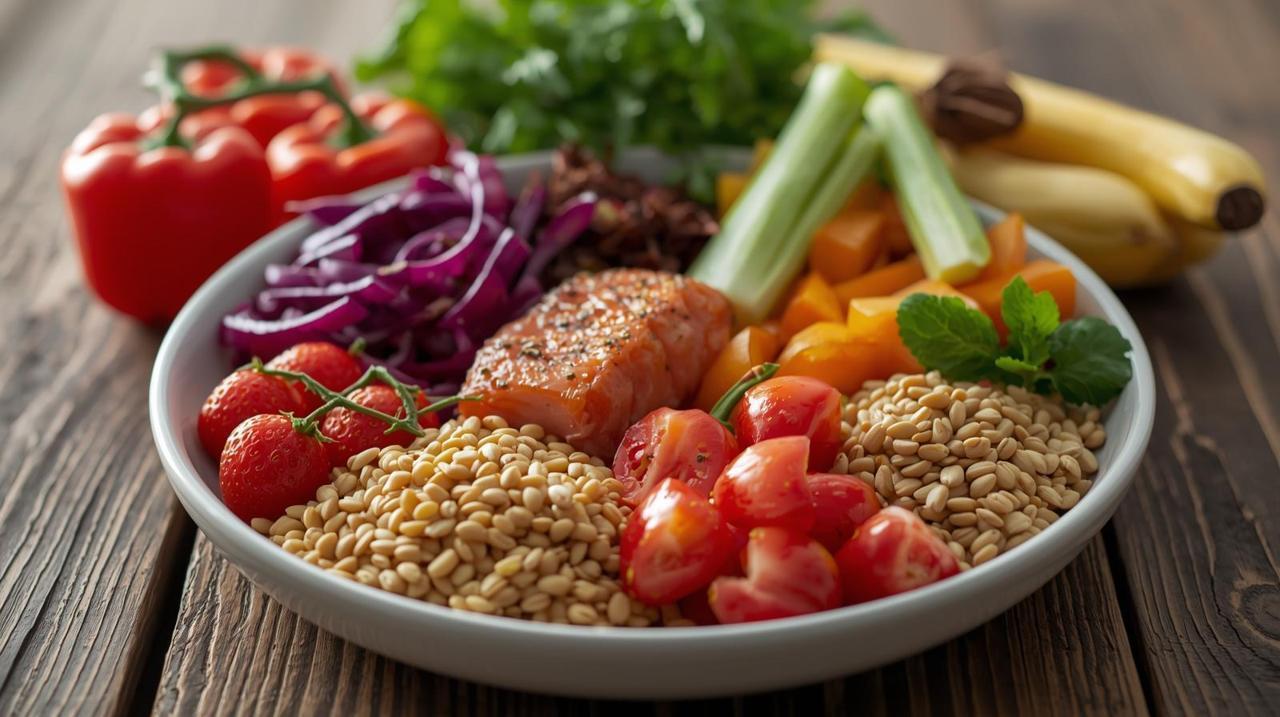You have not yet added any article to your bookmarks!

Join 10k+ people to get notified about new posts, news and tips.
Do not worry we don't spam!

Post by : Samjeet Ariff
Maintaining balanced blood sugar levels is crucial for good health, energy, and preventing chronic conditions like type 2 diabetes. While medications may assist, the right dietary choices are key to naturally regulating blood sugar. By learning about foods that influence glucose levels and emphasizing balanced nutrition, you can take charge of your health and enhance long-term well-being.
This guide offers insights into effective dietary practices, food recommendations, and lifestyle enhancements to manage blood sugar naturally.
Glucose, or blood sugar, is the main energy source for the body, primarily obtained from carbs. The pancreas secretes insulin, a hormone that facilitates the entry of glucose into cells.
Impaired insulin function or insulin resistance can lead to elevated blood sugar levels, increasing the risk of:
Type 2 diabetes
Heart conditions
Kidneys issues
Nerve damage
Employing dietary strategies to naturally manage blood sugar emphasizes glucose stabilization, enhanced insulin sensitivity, and inflammation reduction.
The glycemic index (GI) indicates how quickly a food boosts blood sugar. Low-GI foods release glucose gradually, minimizing spikes.
Examples of low-GI options:
Whole grains: Brown rice, quinoa, oats, barley
Legumes: Chickpeas, black beans, lentils
Non-starchy vegetables: Broccoli, spinach, zucchini
Fruits: Apples, pears, berries
Tip: Pair carbohydrates with healthy fats or protein for better blood sugar control.
Dietary fiber assists in regulating blood sugar by slowing digestion and minimizing glucose absorption.
Fiber-rich options:
Vegetables: Carrots, Brussels sprouts
Fruits: Avocados, raspberries
Nuts and seeds: Chia, flaxseeds, almonds
Legumes: Lentils, kidney beans
Daily fiber goal: Aim for a minimum of 25–30 grams of fiber daily for glucose regulation and gut health.
Incorporating protein slows down carb absorption, curbing blood sugar spikes. It also aids in preserving muscle mass, enhancing insulin sensitivity.
Recommended protein sources:
Lean meats: Chicken, turkey
Fish: Salmon, mackerel (rich in omega-3s)
Plant-based: Tofu, chickpeas, lentils
Low-fat dairy and eggs
Tip: Ensure every meal includes protein for steady energy and sugar levels throughout the day.
Modern wisdom suggests that healthy fats can enhance blood sugar control. They slow digestion, mitigate glycemic response, and promote heart health.
Sources of healthy fats:
Avocados
Nuts: Almonds, walnuts, pistachios
Seeds: Flaxseeds, chia seeds
Olive oil, coconut oil (in moderation)
Fatty fish, rich in omega-3
Tip: Avoid trans fats and processed oils, as they may hinder insulin sensitivity.
Foods loaded with refined carbs can cause rapid blood sugar spikes, stressing insulin production.
Avoid these:
White bread, pastries, and sweets
Sugary sodas and drinks
Sweetened cereals
Packaged snacks with added sugars
Tip: Opt for whole-grain choices, natural sweeteners like stevia, or naturally sweet fruits.
Several herbs and spices possess blood sugar-lowering properties:
Cinnamon: Enhances insulin sensitivity
Fenugreek seeds: Help lower post-meal glucose
Turmeric (curcumin): Helps reduce inflammation and aids insulin function
Ginger: Enhances digestion and stabilizes glucose
Tip: Incorporate these into dishes, teas, or smoothies for added benefit without sugar.
Structuring meals wisely can help keep blood sugar levels steady. Each meal should contain:
Complex carbs: Whole grains or legumes
Protein: Lean meats, eggs, or tofu
Healthy fats: Nuts, seeds, or olive oil
Fiber: Vegetables and fruits
Smart snack options:
Sliced apple with almond butter
Greek yogurt topped with chia seeds
Raw veggies served with hummus
Choosing smaller, frequent meals assists in maintaining steady blood sugar and energy levels.
Staying hydrated enables kidneys to eliminate surplus sugar via urine and supports metabolic health.
Suggestions:
Consume 8–10 glasses of water daily
Steer clear of sugary beverages, including sodas
Herbal teas or infused water offer flavor without sugar
Diet alone isn’t sufficient; lifestyle choices also play a critical role:
Regular physical activity: Engaging in 30 minutes of walking or exercise daily enhances insulin sensitivity.
Stress management: Chronic stress elevates cortisol, which can spike blood sugar levels. Meditation, yoga, or deep breathing can help.
Getting enough sleep: Poor sleep disturbs insulin functions and glucose metabolism; target 7–8 hours nightly.
Some foods are particularly effective for blood sugar control:
Berries: Packed with fiber and antioxidants
Leafy greens: Such as spinach, kale
Whole grains: Oats, quinoa, barley
Legumes: Lentils, chickpeas
Nuts: Almonds, walnuts
Fatty fish: Like salmon, for omega-3s
Apple cider vinegar: May lower post-meal glucose spikes (consume in moderation)
Monitoring blood glucose levels is essential, even with a healthy diet, to learn what works best for you.
Monitoring tips:
Consult your doctor about using a glucometer or continuous glucose monitor (CGM)
Keep track of your meals and physical activities alongside glucose measurements
Recognize patterns to adjust diet and habits as needed
Consult a healthcare professional if:
Blood sugar remains consistently high or low
You notice symptoms like excessive thirst or fatigue
Other health issues, such as kidney or heart problems, are present
A nutritionist or endocrinologist can devise a tailored plan and suggest supplements if necessary.
By managing blood sugar levels through diet, you can:
Lower the risk of type 2 diabetes
Boost energy levels and mental clarity
Support kidney and heart health
Maintain a healthy weight and decrease inflammation
Consistency in meal planning and nutritious choices is essential for long-term success.
Effectively managing blood sugar naturally through diet is a sustainable strategy for overall well-being. By focusing on low-GI foods, fiber, lean proteins, and healthy fats while minimizing refined carbs and sugars, you can stabilize glucose levels and achieve better health outcomes.
When combined with regular exercise, stress relief, and ample sleep, these dietary methods empower you to naturally control your blood sugar, preventing complications and improving your quality of life.
Remember: Gradual changes in diet and lifestyle can significantly impact blood sugar management and overall health.










Study Warns Using AI for Medical Advice Is ‘Dangerous’ as Users Get Inaccurate Health Guidance
A major new study reveals that artificial intelligence (AI) chatbots and tools may give misleading o

Top Sci-Fi Movies Streaming on Netflix This February: Must-Watch Picks for Genre Fans
A curated news-style guide to the best science fiction films currently available on Netflix in Febru

BCCI Central Contracts Shake-Up: Kohli, Rohit Moved to Grade B as Board Reshapes 2025–26 List
Virat Kohli and Rohit Sharma have been placed in Grade B in the BCCI’s 2025–26 central contract list

Dalal Street Spotlight: Top 10 Stocks Investors Are Watching as Markets Open on a High
Indian stock markets begin the week with strong momentum, and several blue-chip and mid-cap stocks a

Market Movers Today: Key Stocks Set To Watch In Indian Markets
Indian equity markets are poised for active trading as several major companies, including Bharti Air

Milan Welcomes the World: Inside the Grand Opening Ceremony of the 2026 Winter Olympics
The 2026 Winter Olympics opening ceremony in Milan marked a defining moment for global sport, blendi